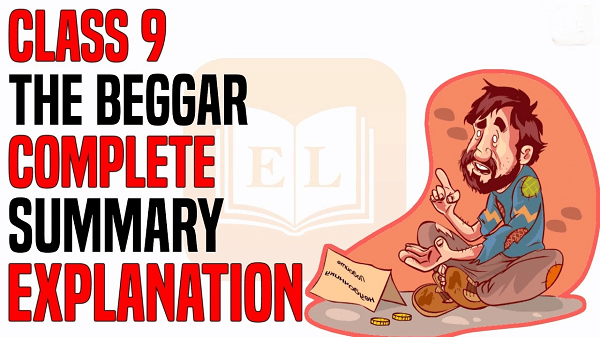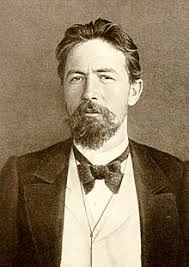CBSE Class 9 English The Beggar SummaryIntroductionThe short story "The Beggar" is part of Anton Chekov's book "The Complete Short Stories." An interaction between a wealthy advocate and an alcoholic beggar is shown in the narrative. The advocate gives the beggar a job. However, it is someone else who genuinely aids him in changing his habits. 
Only when Lushkoff (the beggar) consents to cut wood for him, Sergei (advocate) offers to help. He is of the opinion that Lushkoff will be changed by honest labour. On the other hand, Olga (Sergei's cook) offers assistance to Lushkoff without expecting something in return. True, she chastises him with a harsh tongue, but in the end, she cuts the wood for him so he might make some money. And Olga's attitude toward assisting the less fortunate is what transforms Lushkoff for the better. About the Author
Anton Pavlovich Chekhov , who lived from 1860 to 1904, is seen as one of the greatest authors ever of short stories. He was a Russian playwright, and four of the works which he wrote during his career in the theater have been labelled masterpieces. Writers and reviewers alike hugely esteem his most renowned short stories. Summary
In his short novella "The Beggar," Anton Chekhov describes the life of Lushkoff, an alcoholic beggar who used to forage for food along highways since he was jobless. He started to begging as a means of survival. He requested some employment from affluent attorney Sergie, whom he met one day. His eyes were glassy from drinking and there were two red blotches atop his cheeks. A ratty, singed coat covered his body. He declared he was ousted from his job as a teacher of a rural area because of a plotted conspiracy against him. To go on existing he was compelled to beg for his survival. Upon seeing the beggar, Sergei recalled encountering him earlier that day on a different street. He shared that he had been booted out of school and Sergei was so mad at him being deceptive that he threatened to inform the police and start an inquiry into him for telling untruths. Upon realizing this, Lushkoff began weeping and explained that he had been inventing stories to make people empathize with him. After singing in the Russian choir, Lushkoff admitted he was previously let go from his job because of an alcoholism problem. He begged for Sergei to give him a chance to make money and survive. In response, Sergei asked him to go to his house and chop wood. Lushkoff agreed, and Sergei quickly sent his cook Olga to take him to the shed and help him with the task. Olga scoffed as she glanced over at Lushkoff, who was trying to hack away at a piece of wood despite being noticeably weakened due to his alcoholism. It was a gloomy day, and it was disheartening to watch Lushkoff do such tiring and insignificant tasks. Sergei felt terribly sorry for him and wished she could do something to make it up to him. An hour later, Olga announced that the wood was finally chopped up. As a gesture of appreciation for Lushkoff's hard work, Sergei asked her to give the man fifty cents. Eventually, he began arriving once each month to complete his job and leave once he had received his wages. Soon later, Lushkoff, who was now a kind and sober guy, was employed by Sergei to pack and move furniture when he moved into a new house. He used to shake in the cold, yet he was effective in his work. Sergei offered him a job as a cleaner after seeing his dedication and asking whether he could write. Lushkoff handed Sergei a letter that required a little copying and was going to be addressed to a friend in response to his affirmative response. Lushkoff did this but left Sergei's home without going back. Two years later, Sergei once caught Lushkoff buying his theater ticket. He gave off a polished, well-groomed appearance. Sergei asked after being startled by his transformation. Lushkoff answered that he was employed as a notary and had a monthly pay of 35 roubles. Sergei was happy to be able to help Lushkoff become a more responsible person and felt good about leading him in the right direction. Sergei was generous enough to assist Lushkoff when he was just a beggar, and Lushkoff appreciated him for that. In addition, he said that Olga's sympathy made him appreciate her more. He said she had been assigned to chop the wood for him. She would give him the money in compensation for the wood-chopping job she had done since she was a kind person. She would frequently try to set him straight, but sadly, she was aghast when she saw how terrible his condition was. It was her duty to tell him to stop drinking and to persuade him to correct his actions. As a result of her helpful advice and hard work, Lushkoff changed his perspective. He quit alcohol entirely and made a vigorous effort to earn money to support himself. He declared that because she had been a source of strength, he will always be grateful for her friendliness and help. ConclusionThis narrative has two messages. One, it is important to lend a helping hand to those who are in need so they can improve their lot in life. Lushkoff receives assistance from Sergei and Olga in order to stop panhandling and start working. The second lesson is that beggars should be embarrassed by their behaviour. Everyone should make an effort to get employment and support themselves. You will always get a job if you are willing to work. Therefore, one ought to lead an honorable life. This class's second lesson is about it. Olga, the maid, exhibits this mentality. Olga is kind to Lushkoff and supports his efforts to give up drinking and live a better life.
Next TopicThe Color Purple Summary
|
 For Videos Join Our Youtube Channel: Join Now
For Videos Join Our Youtube Channel: Join Now
Feedback
- Send your Feedback to [email protected]
Help Others, Please Share









